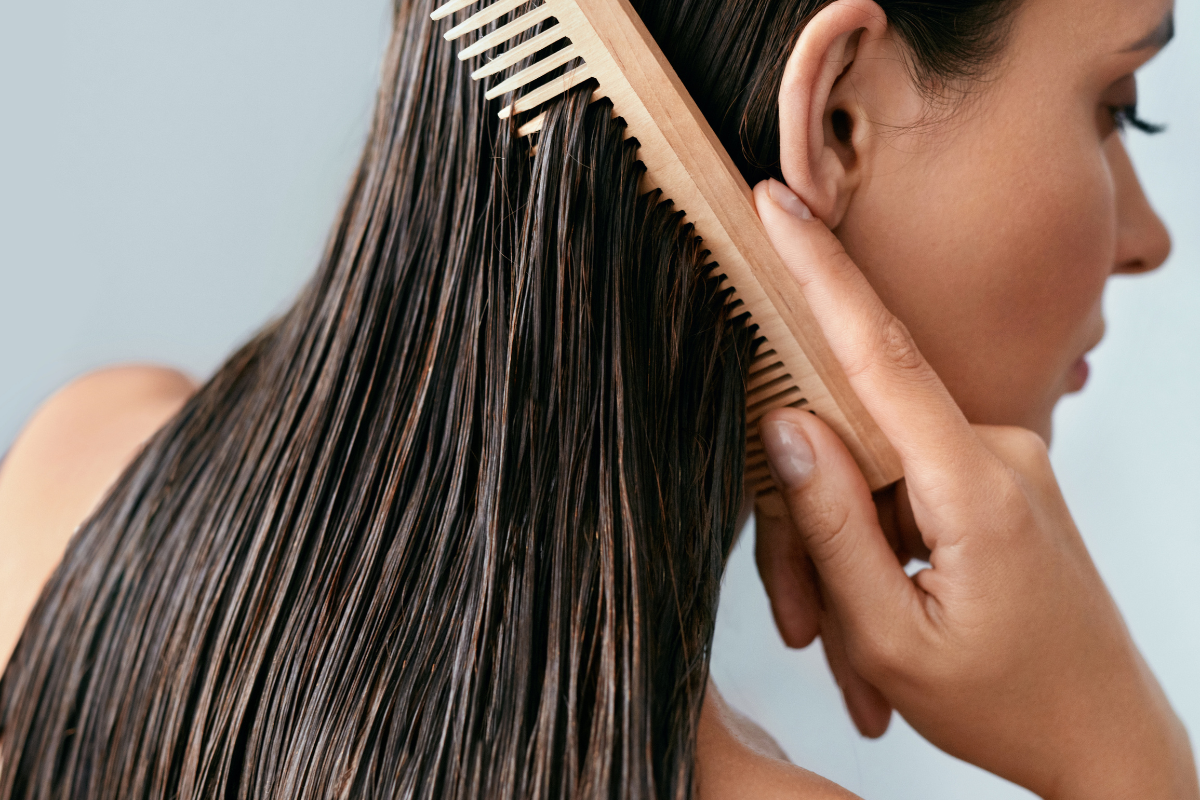Thick hair - the best supplements

Approximately 55% of all women will at some point in their lifetime experience hair loss and thinning hair, while a majority of men go through some type of hair loss. In fact, poor nutritional intake, including vitamin and mineral deficiencies, is a common factor in hair loss. A good diet and boosting supplements can fix the root of the problem. If you are not sure what deficiencies you may have, then a blood test can be the first step in finding the cause of hair loss or thinning hair.
The truth is that hair loss is a complex process involving various genetic, hormonal and environmental mechanisms. Just like our skin, the hair follicle is subject to both internal and external aging.
Sometimes hair loss is also due to e.g. vitamin or mineral deficiency. Fortunately, a deficiency can be corrected by adding vitamin-rich and mineral-rich foods to your diet or taking supplements with other boosting substances such as the proteins collagen and keratin.
Try these healthy vitamins, minerals and proteins if you want thicker, fuller and healthier hair:
Collagen and Keratin
Hair mainly consists of the protein keratin . Your body uses several amino acids to build keratin - some of which are found in collagen. When you consume collagen and other proteins, your body breaks them down into amino acids, which are then used to build new proteins and compounds.
There are 11 non-essential amino acids (non-essential amino acids) that your body can make on its own and 9 essential amino acids (essential amino acids) that you need to get from your diet. Collagen mainly consists of 3 non-essential amino acids: proline, glycine and hydroxyproline.
Proline is also the main component of keratin. Therefore, proline-rich collagen gives your body the building blocks it needs for thick and healthy hair. When keratin proteins break down in the hair follicles, this can lead to hair loss and pigment changes, which can result in gray hair.
The collagen counteracts damage to the hair follicles
Collagen can act as an antioxidant and fight damage caused by free radicals. Free radicals are compounds that develop in the body as a result of air pollution, smoking, poor dietary choices, alcohol and other environmental pollutants. Too many free radicals can damage your cells, proteins and DNA.
Research shows that free radicals can also damage hair follicles. As the body's defense against free radicals decreases with aging, older people are more susceptible to damage to their hair. To fight free radicals and promote healthy hair, your body needs antioxidants.
Several test-tube studies have shown that collagen – especially from fish – can have a powerful antioxidant effect.
One study found that marine collagen could fight four different free radicals, while another study observed that the protein may be a more effective antioxidant than a well-known compound found in tea.
The collagen can counteract hair thinning
Collagen makes up about 70% of the dermis, the middle layer of your skin that contains the root of each individual hair. In particular, collagen contributes to the elasticity and strength of the dermis. As you age, your body becomes less efficient at producing collagen. This may be one of the reasons why hair thins over time.
Therefore, you should boost your body with collagen if you have crossed the age of 25 to give your body collagen that helps maintain healthy skin and healthy & thick hair.
An eight-week study of 69 women aged 35-55 found that they significantly improved their skin's elasticity compared to the placebo group by taking collagen supplements.
Another 12-week study of more than 1,000 adults found that a daily collagen supplement improved the amount of this protein in the skin and reduced signs of skin aging.
Since hair grows out of the skin, collagen's potential to counteract the effects of skin aging can contribute to better hair growth and counteract thinning hair.
COLLAGEN CAN PREVENT HAIR FROM GOING GRAY
Due to its antioxidant properties, collagen can fight cell damage and prevent premature graying of hair. Age-related gray hair is largely influenced by genetics, but free radicals damage the cells that produce the hair color and this can also play a role.
As you age, the cells that produce the hair pigment - melanin - and which gives your hair its color, naturally begin to die. However, free radicals resulting from poor diet, stress and environmental pollution can also damage the melanin-producing cells.
Without enough antioxidants to fight free radicals, your hair can turn gray prematurely. In fact, a test tube study found that the antioxidant activity of the follicles that grew gray hair was much lower than that of the follicles that still contained melanin.
Because collagen has been shown to fight free radicals, it can help prevent damage to cells that produce melanin (the pigment that gives your hair its color). As a result, it can prevent premature graying of hair or slow down age-related gray hair.
COLLAGEN IS EASY TO GET EVERY DAY
You can add collagen to your diet through foods or supplements. However, with today's traditional diet (where we no longer long-cook animal parts, etc.), it is easiest to ingest collagen from a dietary supplement in powder form.
Broth made from, for example, animal parts contains both collagen and gelatin, and is a cooked form of collagen.
In addition, you can eat a diet rich in vitamin C, which increases the body's natural collagen production. Oranges, peppers, Brussels sprouts and strawberries are excellent sources of this vitamin.
Finally, collagen from supplements and the powder form is preferable as you need to get 5-10 mg a day. Most collagen supplements are also hydrolyzed, meaning they are already broken down and easier for the body to absorb.
ZINC
Various zinc compounds have been used for decades to treat conditions such as telogen effluvium (hair loss) and alopecia areata (patchy hair loss), as zinc benefits hair follicle health. Zinc is an important cofactor for several enzymes and is involved in important functional activities of the hair follicle.
Zinc is also a potent inhibitor of hair follicle regression, and it speeds up hair follicle recovery. Studies indicate that some alopecia areata patients are zinc deficient and taking zinc from dietary supplements is an effective treatment.
In a 2013 study, researchers evaluated the role of zinc status in each of the four types of hair loss, including alopecia areata, male pattern baldness, female pattern baldness, and telogen hair loss. In all alopecia patients, the mean serum zinc level was significantly lower than the control group. The analysis of each group showed that all groups with hair loss had statistically lower zinc concentration, especially the alopecia areata group. The data led to the hypothesis that disturbances in zinc metabolism play a key role in hair loss.
If you think your hair loss is due to a zinc deficiency or other measurable causes, you can check this with a blood test done in collaboration with our partner BLODKOLLEN.
BIOTIN
Biotin (vitamin B7) has long been used as an alternative treatment for hair loss. Biotin benefits your hair by rebuilding hair that has been damaged by over-shampooing, sun exposure, blow-drying and straightening.
A strong sign of a biotin deficiency is hair loss. A deficiency can be caused by smoking, impaired liver function or even pregnancy. Research suggests that many women develop a biotin deficiency during a normal pregnancy because the rapidly dividing cells of the developing fetus require biotin for various processes.
To counteract hair loss and increase hair strength, it is good to take a B vitamin complex daily, or to take biotin separately. Eating foods rich in biotin, such as eggs, beef, chicken, avocados, legumes, nuts and potatoes, also helps avoid a deficiency and promotes hair growth.
Vitamin C
Experimental evidence suggests that oxidative stress plays an important role in the aging process. Free radicals are highly reactive molecules that can directly damage cellular structural membranes, lipids, proteins and DNA.
With age, the production of free radicals increases and the amount of antioxidant enzymes that defend the body decreases, which leads to damage to cellular structures and aging of the hair. By acting as an antioxidant, vitamin C fights oxidative stress that contributes to gray hair and hair loss.
To fight free radicals and protect hair from aging, load up on vitamin C-rich foods like oranges, red bell peppers, kale, Brussels sprouts, broccoli, strawberries, grapefruit, and kiwi. If you need a dietary supplement , take 500-1000 milligrams of vitamin C twice daily, for the best antioxidant effect.
IRON
Several studies have investigated the relationship between iron deficiency and hair loss, and some suggest that iron deficiency may be related to alopecia areata, androgenic alopecia, telogen effluvium, and diffuse hair loss.
Researchers at Tehran University of Medical Sciences in Iran studied the relationship between the body's iron status and different types of hair loss. They conducted a study to assess whether diffuse telogen hair loss in women between the ages of 15 and 45 is associated with iron deficiency - 30 women with documented telogen hair loss were compared to 30 women without hair loss.
The researchers found that, of the nine patients with iron deficiency anemia, eight had telogen hair loss. Mean ferritin levels (a protein in the body that binds to iron) were statistically significantly lower in patients with diffuse telogen hair loss than in subjects without hair loss. The study suggests that women with iron deficiency have a higher risk of hair loss, and serum ferritin levels below or equal to 30 milligrams/milliliter are strongly associated with telogen hair loss.
Too little iron can also cause hair to turn gray prematurely.
To promote hair growth, make sure to eat foods that contain iron in your diet every day. Eat lots of spinach, egg yolks, beef and beans. Since an iron deficiency can lead to hair loss, make sure you get your daily recommended amount by eating iron-rich foods.
However, be careful about taking a dietary supplement with iron, unless you have been confirmed to have an iron deficiency. People who do not get increased iron levels in their body from food or supplements should undergo further testing to identify other underlying causes of iron deficiency and hair loss.
If you think your hair loss is due to an iron deficiency or other measurable causes, you can check this with a blood test done in collaboration with our partner BLODKOLLEN .
VITAMIN D
The hair follicles are very sensitive to hormones, and vitamin D is a hormone that plays an important role in calcium homeostasis, immune regulation, cell growth. In the scientific world, it is well known that alopecia areata is common in patients with vitamin D deficiency. Vitamin D-resistant rickets or vitamin D receptor mutation.
Research suggests that insufficient levels of vitamin D are involved in a variety of autoimmune diseases, including alopecia areata. A cross-sectional study with 86 patients with alopecia areata, 44 patients with vitiligo and 58 healthy controls was conducted. Serum vitamin D-25-OH levels in the patients with alopecia areata were significantly lower than in the patients with vitiligo and the healthy controls. In addition, a significant inverse correlation was found between disease severity and Vitamin D-25-OH serum levels in the patients with alopecia. Researchers concluded that screening patients with alopecia areata for vitamin D deficiencies appears to be of value in order to prescribe a dietary supplement with vitamin D to these people.
Direct sun exposure is the best way to absorb vitamin D. Expose your skin to the sun for about 10-15 minutes to absorb about 10,000 IU (250 μg) of natural vitamin D. To increase your vitamin D levels from food, you can benefit from eating: halibut, mackerel, eel, salmon, whitefish, swordfish, maitake mushrooms and portabello mushrooms.
If you think your hair loss is due to a vitamin D deficiency or other measurable causes, you can check this with a blood test done in collaboration with our partner Blodkollen.
FOLATE OR FOLIC ACID – VITAMIN B9
Folate/folic acid is needed to form new cells and red blood cells. These cells include those found in your skin tissue as well as in your hair and nails. This B vitamin keeps these cells and red blood cells healthy, optimizing hair follicles to support hair growth. Generating new red blood cells can help in the keratinization of hair which generates hair growth and which stops hair loss.
In addition to preventing hair loss and supporting hair growth, folic acid or folate has other benefits for hair. A lack of this B vitamin can cause hair to thin and eventually fall out, as the hair becomes weak. The increase in new cell production that the vitamin provides can therefore cause hair to grow where it has thinned.
Folate is the variant that comes from food and folic acid the variant that comes from dietary supplements. Both have the same effect in the body.
COBALAMIN – VITAMIN B12
Vitamin B12 promotes healthy hair growth by aiding in the production of oxygen-rich red blood cells that supply hair follicles with the nutrition they need. A lack of the vitamin can cause hair to fall out more easily and fall out more easily.
The vitamin can also help prevent premature graying of hair. Lack of vitamin B12 is actually one of the most common causes of premature graying of hair!
Researchers have seen that vitamin B-12 deficiency often goes hand in hand with a deficiency of folate and biotin, in people whose hair has begun to gray prematurely.
ARE THERE VITAMINS AND MINERALS THAT CAN CAUSE HAIR LOSS?
Yes, there is. Both vitamin A and the mineral selenium can cause hair loss if a person consumes excessive amounts of these nutrients from supplements. However, both selenium and vitamin A are needed for healthy hair, in moderate amounts.
ARE THERE VITAMINS AND MINERALS THAT CAN PREVENT HAIR FROM GRAYING PREMIER?
Yes, there is. The minerals iron and selenium, as well as vitamin D, vitamin B9 (folate, folic acid) and vitamin B12 (cobalamin), can prevent premature graying of hair.
- Tags: Hår/Hair Kollagen/Collagen






